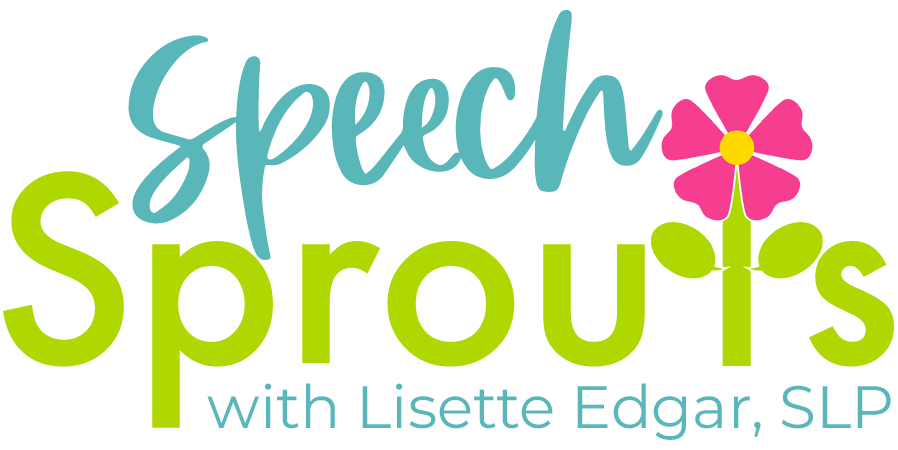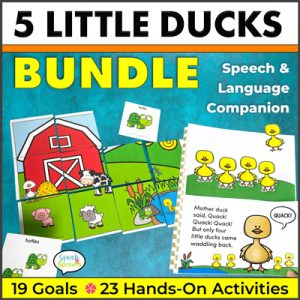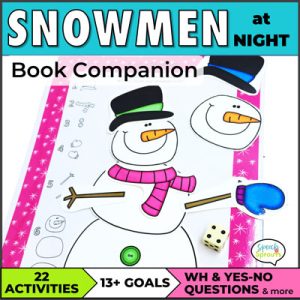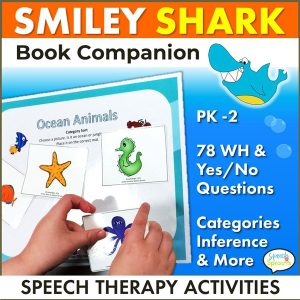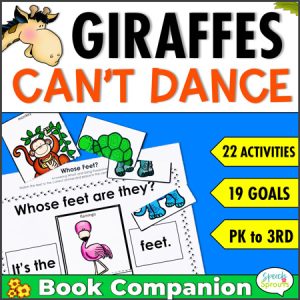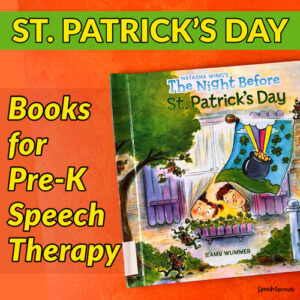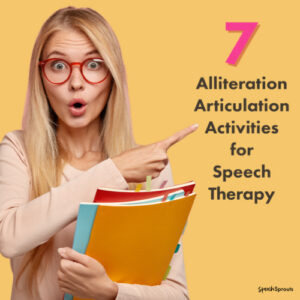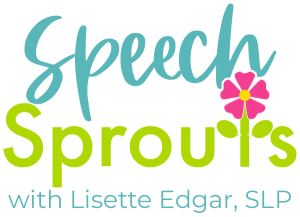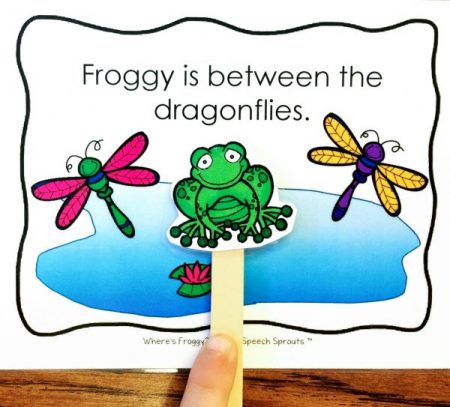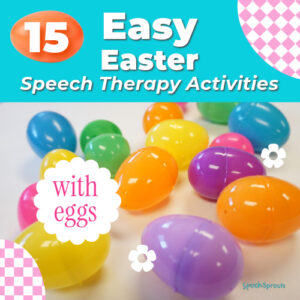
An Intensive Service Delivery Model for Preschool Speech Therapy
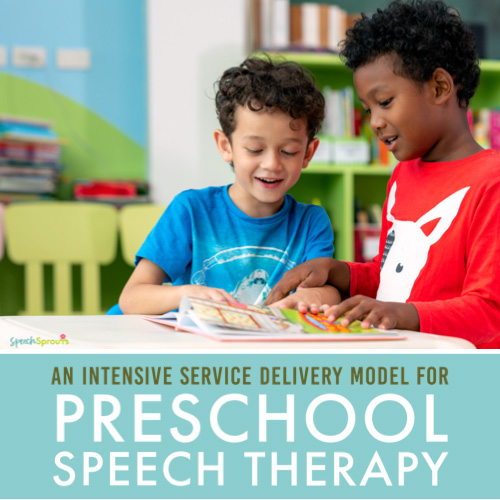
Literature and theme-based intervention is a natural for preschool speech therapy.
Today I’d like to share my experience providing speech therapy to preschoolers with a larger group, intensive service delivery model. If you haven’t seen this model, or tried it yourself, you are in for a treat.
I have lots of preschoolers on my caseload.
Over the years, I’ve learned a bunch from these adorable, huggable, wiggly, sniffly, and enthusiastic little ones in my preschool speech therapy sessions.
- Most three and four-year-olds are not ready to sit for extended periods of time and drill on skills. They need movement.
- Play is the natural way for little ones to learn.
- Be sure you keep plenty of tissues and hand sanitizer on hand!
- Thematic activities are powerful ways to teach vocabulary. Themes build a meaningful framework for new vocabulary and help link new words to existing experiences and knowledge.
- Little ones are multi-sensory learners. They need to experience see, feel, listen, taste, and manipulate materials for maximum learning and progress.
- Be prepared to give and get lots of hugs. And a few tears.
- Children with phonological disorders often need intervention for delays in a range of language and phonological skills. They are at risk for reading struggles.
- It’s difficult, and often inefficient, to target needs one by one. Storybook reading and play activities provide rich opportunities to target multiple skills at once.
- Skills learned in context, integrated into natural communication, have the best chance of carryover outside of therapy.
A few years ago, my district was challenged to develop new service delivery models for preschool speech therapy students.
An SLP friend and I became interested in programs that served children in a more natural communication environment.
We wanted to switch up the traditional 30-minute, walk-in session model for a model that would offer more opportunities for children to build on their background knowledge through play and literacy-based activities.
We visited two pilot programs in our area which offered longer sessions in a preschool-like setting with larger groups of children (up to 10).
We thought “Ten kids in a session, are you kidding?” But it worked, the therapist had an assistant, and the kids rotated through centers. More about that in a minute.
We really liked the format, because it was literature and theme-based. There is much evidence in the literature about the benefits of adult-child storybook reading.
This program provided opportunities to efficiently build alphabet knowledge, print awareness, phonological awareness, and oral language skills. It provided intensive articulation practice.
We decided to start a similar preschool speech therapy program in our district.
We got the green light from administration and were assigned a paraprofessional to assist. We called our program LEAP: Language and Early Articulation for Preschoolers.
We quickly realized that while we could pattern our program after the framework of other districts, we were going to have to develop the lessons ourselves from scratch!
We used the book, Once Upon a Sound by Linda Smith-Kewel and Tracey Molenaar Claeys as a starting point. We added, adapted, and substituted books and activities to suit our children’s needs.
Together, we spent many long hours that first year developing lesson plans. At the time of this post, we’ve wrapped up year four, it has gotten so much easier, and I’m still still loving it!
Here’s our preschool speech therapy model in a nutshell:
- We serve 3, 4, and 5-year-old preschool children in our LEAP program with mild-moderate language delays or any level of articulation delay.
- Each group is seen for two hours, twice a week. Children with more severe articulation disorders may be seen for additional sessions.
- We have a paraprofessional assistant. (You don’t want to try this by yourself!) Our assistant is intuitive and amazing. She has learned to prompt the children throughout the session. The kids are getting modeling, scaffolding, and correction many times per session from both of us.
- We use a cycles approach for articulation: all activities reinforce a chosen phoneme/ phonological process target each week. The targets are changed weekly. Language skills are integrated throughout each session as well.
What do our preschool speech therapy sessions look like using this theme and literacy-based model?
Here’s the general schedule for each session. Establishing a routine helps children know what to expect, transition independently (or at least more smoothly with less support needed), and boosts engagement.

Our circle time routine:
- Sponge Activity: I show a YouTube video or two while the kids get settled and take turns using the restroom before we start. I’m fortunate to have an interactive whiteboard. Literacy skills are important for our speech-delayed kids, so I always show an alphabet video, and then another video based on the week’s theme and targets.
- Movement Activity: This helps to get the kids ready to attend. Patty Shukla has some awesome videos for this on YouTube, like this one: JUMP! We sing, we dance, and we do fingerplays. It’s a blast! ( You can find loads of songs and fingerplays in my posts.)
- Introduce the Weekly Target: We write the letter or letters that make the sounds on the board and I model the sound for them while demonstrating placement. I have a feely bag with small toys in it beginning with our sound. Kids adore reaching in to see what’s inside and name it.
- Sound-Loaded Storybook: Literature-based therapy provides the opportunity to work on so many targets at once. We read the story, use puppets, objects, and magnet board pictures to illustrate, retell, and act out the story.
There are so many opportunities to scaffold and expand utterances during storybook discussions and narrative re-telling in preschool speech therapy.
We work on print awareness, phonemic, and phonological awareness: We identify words with our sound, discuss rhyme, and clap out syllables. We answer WH questions, predict, discuss basic concepts, new vocabulary, and categorize whenever the opportunities arise during the story. All with one efficient activity!
I’ve developed an extensive list of sound-loaded books to target each phoneme.
Read more about it in this post: Sound-Loaded Storybooks For Articulation. Save yourself some time hunting for sound-loaded books, I’ve got you covered. The list is a freebie, so be sure to check it out.
Here are our preschool speech therapy centers:

Children rotate through each center for 5-10 minutes each.
- Kitchen center: Play food and dishes for imaginative play.
- Activity Center: Toys are chosen for the week’s target. It may be a farm set for initial /f/, cars with a street scene carpet for velars, or stacking cups for final /ps/ blends.
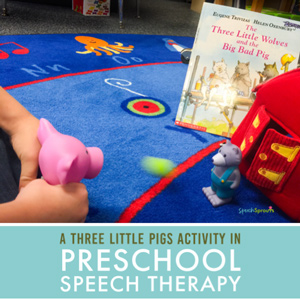
- Puzzle Table: This center may have puzzles, file folder games, or cookie sheet activities featuring the chosen targets. We have a Humpty Dumpty puzzle for initial /h/, or colorful printed fish to make an “ocean” for final sh. We also put sensory bin activities here.
- Computers/iPads I have three student computers in my room. We created a PowerPoint auditory bombardment for each target. The children listen and watch the bombardment activity on the first computer, then move to the next computer and engage with language and phonological awareness software. I liked the Buddy Bear software (Autism and PDD series) from Linguisystems and my old copy of Earobics.
- Art Table: My paraprofessional assistant works with 2-3 children at a time doing hands-on activities designed to elicit plenty of articulation repetitions. She gets to have all the fun! There’s painting, play dough activities, making booklets, stringing, gluing, washing, tasting, digging, matching, fishing, game-playing, you name it. Our kids get to practice making requests as they ask for materials. My assistant corrects and models for the kids, reinforcing vocabulary, syntax, and sentence structure skills.
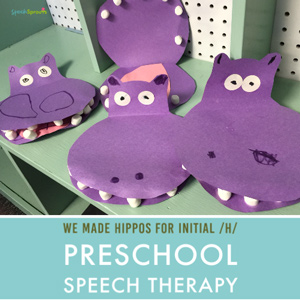
- Ipad: The kids engage with apps chosen for language or thematic content.
- Library Center: We stock a bookshelf with a different selection each week of books that reinforce our target. Add a beanbag for a comfy reading spot.
- Speech Time: This is one-on-one time at the table with the SLP. We work on each child’s specific needs, articulation words, and language targets. I use a variety of super-quick motivational activities to make it fun.
Closing circle:
Back on the carpet, we discuss our activities for the day, providing practice on past tense verbs. If time allows, we read a second story. I love sending the student’s work home to provide more opportunities for parents to discuss/practice with their children.

How on earth do I keep all the lessons and materials organized?
Read about How to organize for Grab-and-Go Articulation Therapy HERE.
Whew! It’s a jam-packed two hours.
Parents, principals, and kids love this preschool speech therapy model.
I love it because it provides me the opportunity to:
- work with each child individually
- incorporate pre-literacy skills
- provides tons of opportunities for language and articulation practice.
- I get to develop a deeper understanding of each child’s needs and see how well their skills carry over into genuine, functional communication during our busy, activity-filled sessions.
We’ve found that we’re seeing fewer of our children (who have participated in our LEAP program) retained in kindergarten, We also see better progress in language skills, and often faster progress in articulation skills as compared to a traditional walk-in preschool therapy model.
I hope you got some great ideas for your preschool speech therapy kiddos. If you’re thinking about or are ready to launch a similar program and have questions, drop me a note in the contact box on my home page.
If you’re ready to add more literature and theme-based therapy activities to your sessions…
Check out my themes category for lots of activity and book ideas. Here are just a few of the posts you’ll find.
Monkey/ Jungle Animal theme and More monkeys
Snowman Theme and a Snowman Craft
St. Patrick’s Day Books for Preschoolers
You can also can find my done-for-you themed and literacy-based activities in my TpT store or you can purchase these right here on my website.
Happy planning!
Share it:
- Read more about: Articulation, Language, Preschool
